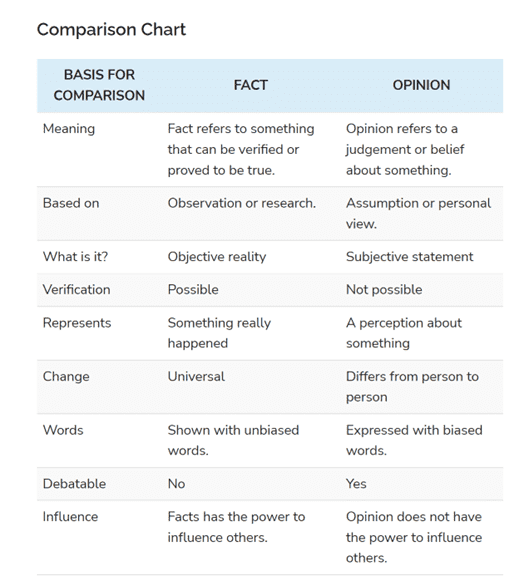One of my former coaches reposted a banner that said, “A fact is information minus emotion. An opinion is information plus experience. Ignorance is an opinion lacking information. And stupidity is an opinion that ignores a fact.”
The last line might sound harsh, in which was his comment to the post, yet the dictionary states that stupidity is simply behavior that shows a lack of good sense or judgement. The example given at dictionary.com is, “I can’t believe my own stupidity.”
Every one of us faces challenges daily in the world with deciphering fact from opinion. How someone feels about something is their opinion, and they have a right to it, from recall or not. The difficult part of day-to-day business is balancing the time that needs to be allocated to addressing stupid opinions to obtain buy-in for the ability to move forward without pushback.
The Role of Logical Reasoning in Distinguishing Fact from Opinion
How do you determine fact, validate opinions, and focus your time on fact and validity to maximize time and mitigate risk in the workplace?
In grade school, you are taught how to decipher fact and opinion with questions such as:
Cell phones may or may not cause brain cancer.
Fact or Opinion? Explain: ___________________________
Chicken has more protein than green beans.
Fact or Opinion? Explain: ___________________________
The more money someone has, the more successful they are.
Fact or Opinion? Explain: ___________________________
On Key Differences, a website that specializes in comparisons, an article they published in 2017 discusses how to decipher fact from opinion. They even provide a comparison chart.

To sum it up, fact is an actual thing that exists as it can be proven, observed, or measured. Opinion is a belief or judgment that is not founded on proof or certainty.
How to Use Evidence to Support Objective Thinking and Decision-Making
An example of how fact and opinion get wrestled with all the time in the workplace is when someone says they completed something yet did not prove that to be fact because they did not provide back-up to the action. If you are sent to verify someone’s work, taking a picture of what you looked at if questioned verifies it to be fact. If you reached out to someone by telephone, then a follow-up with an email or text message stating you called them, along with your call record, is verification. When looking for facts, indicators include numbers, corroboration, statistics, pictures, eyewitnesses, documentation, and records as part of the verification, and those things can be substantiated for authentication. When people provide us with reference letters or emails from references with no identifying factors, we require the receipt data from the email or a way to reach out to the reference to verify the reference did indeed come from them.
Fact vs Opinion
If you hear someone use words such as believe, think, always, never, might, should, guess, point of view, interpretation, good, bad, right, wrong, then it most likely is their opinion if they do not have an accompanying verifiable fact.
Do you rationalize happenings in the workplace? If you trust yet verify, I guarantee you will earn the respect of others so they will value your opinion more. After all, back-up data not only shores up potential delays, but it ultimately builds relationships and projects.
To Living by the “CYA” Method,
Suzanne Breistol

